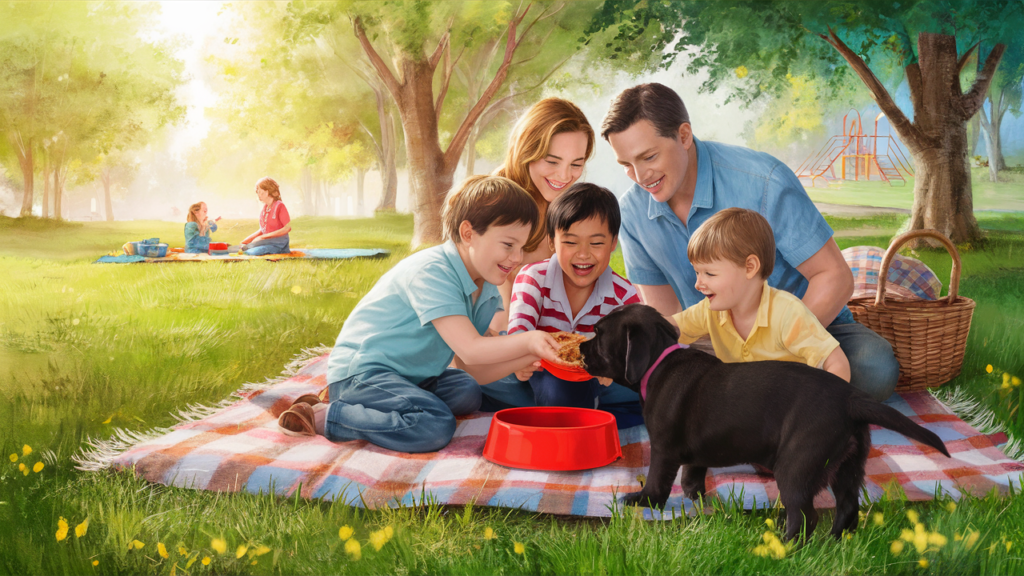 Welcome Home: Navigating Your Puppy’s Nutritional Journey
Welcome Home: Navigating Your Puppy’s Nutritional Journey
Bringing a dog home brings both joy and new responsibilities. One of the initial questions is about the appropriate feeding amount for puppies. What amount should you feed your puppy? One of the first and most important things you can do to ensure your new furry friend’s health and growth is to provide sufficient nutrition. Puppies’ nutritional requirements differ significantly from those of adult dogs. Their bodies develop quickly. Therefore, they require sufficient water, protein, fat, carbohydrates, vitamins, and minerals.
Essential Nutrition for Your New Puppy
A balanced diet can considerably improve your puppy’s energy levels, muscular growth, and bone development. Dietary lipids promote energy production and brain growth, high-quality protein aids in tissue repair, carbohydrates supply extra energy, and essential nutrients such as amino acids contribute to overall vitality. Puppy food has a composition different from adult dog food in that it meets the unique nutritional demands of puppies during their formative years.
Choosing the Right Puppy Food
When it comes to puppy food, understanding the unique nutritional needs of puppies is more critical than merely choosing a well-known brand. Choosing products suited for pups is critical whether you like wet food, dry food, or a combination. Wet dog food may be more straightforward for young puppies to chew and digest, and it is also a great way to keep them hydrated. The converse is true for dry kibble, which promotes dental health by lowering plaque levels.
|
Want To Own A Introducing Hands-off Dog Training Secrets and Information With Fast, Effective Results That Save Hours Of Your Time Every Week!! Sign up for a FREE mini course on training your Dog |
Educating Yourself for Better Puppy Care
Recognising the signs of good health and knowing what to feed your puppy is essential. Look for visible indicators of a good diet, such as a shiny coat, clear eyes, and consistent energy levels. Puppies have various dietary needs based on breed and size, so food selection is crucial.
Optimizing Puppy Growth: Tailored Nutrition for Different Breeds and Sizes
Nutritional Needs Across Different Puppy Breeds
The food requirements of puppy breeds might vary considerably. Large breeds require a diet that supports consistent growth to avoid joint problems later in life, whilst smaller breeds frequently require calorie-dense meals to sustain their rapid metabolisms.
Custom Diets for Small and Large Breed Puppies
Small breeds should eat frequently to maintain their energy levels and preserve their delicate digestive systems from being overloaded. Great Danes and other large breeds should eat a diet that promotes steady, moderate growth and includes joint support supplements.
Lifecycle Nutrition from Puppy to Adult
Puppies’ dietary requirements change as they develop. Puppy formula or breast milk could be the initial nutritional mainstay for young puppies as they transition to solid foods. Milk replacers can be extremely useful for weaning puppies from their mother’s milk. It would be beneficial if you considered the puppy’s development into an adult dog, which involves transitioning its nutrition from puppy to adult dog food between the first year and eighteen months of age (though this varies by breed).
 Establishing a Feeding Routine for Optimal Puppy Growth
Establishing a Feeding Routine for Optimal Puppy Growth
Creating a Consistent Feeding Schedule
Puppies who follow a regular feeding schedule benefit from early and persistent good eating habits and digestive management. The ideal method to nourish a young puppy is to stick to a puppy feeding schedule, which usually includes multiple meals throughout the day. As individuals get older, their food consumption habits shift.
Measuring the Right Amount of Food
The Association of American Feed Control Officials (AAFCO) has recognised feeding instructions provided by food manufacturers as an excellent method for calculating a puppy’s food needs. These factors consider the puppy’s age and weight and predict adult size.
Monitoring Health and Development Through Nutrition
Observing Growth and Health Indicators
You must monitor your puppy’s development and health frequently. A body condition score may help you decide whether your dog is overweight or underweight. Puppies of various sizes and breeds develop at different rates, and their food requirements may change rapidly.
Managing Diet and Digestion
Dietary changes or introducing new foods may confuse a puppy’s digestive tract. The most straightforward approach to ease a puppy’s digestive tract into new foods is to introduce them gradually, mixing them with old ones. Furthermore, your puppy’s health requires continual access to clean water.
|
Want To Own A Introducing Hands-off Dog Training Secrets and Information With Fast, Effective Results That Save Hours Of Your Time Every Week!! Sign up for a FREE mini course on training your Dog |
Final Thoughts
One of the most important things you can do to help your puppy grow up healthy and strong is to provide it with lots of food. Establishing a consistent feeding schedule, understanding your puppy’s dietary needs, and monitoring their development and health will give them the best possible start. The first step towards a happy, healthy life together is to provide your puppy with appropriate food based on its breed and size.
Frequently Asked Questions
What is the best way to determine the appropriate food for my puppy? When selecting how much food to feed your puppy, consider its age, breed, size, present activity level, and predicted development pace. Follow the recommended feeding schedule on the puppy food container as a guide, but adjust as needed. Check-in with your veterinarian for specific recommendations as you regularly examine your pet’s health.
How often should I feed my puppy each day? Puppies under six months should be fed three to four times daily to maintain their high energy levels and rapid development. You can wean them off three meals each day as they grow older to allow their slower development and transition to adult food.
What should I look for in high-quality puppy food? High-quality puppy food should have a well-balanced blend of protein, fat, carbohydrates and minerals to support healthy development and growth. When shopping for puppy food, search for labels that say it’s safe for puppies and has the seal of approval from a reputable organisation like the AAFCO.
How do I transition my puppy to solid food? Mix a little dog chow with warm water or formula to create a porridge-like consistency. Over a few days, progressively reduce your intake of liquids while increasing your intake of solids. Introducing your dog to new food gradually helps reduce the likelihood of gastrointestinal upset.
Can I give my puppy human food? In general, keep puppies away from human food. Puppy food developed for people may be harmful and low in essential nutrients. Instead, feed your puppy well-balanced puppy food. Please check with your veterinarian to ensure your puppy’s human meals are healthy and appropriate for its diet.
|
Want To Own A Introducing Hands-off Dog Training Secrets and Information With Fast, Effective Results That Save Hours Of Your Time Every Week!! Sign up for a FREE mini course on training your Dog |
Additional Resources
- American Kennel Club – Puppy Feeding Fundamentals
- This resource offers detailed guidance on feeding puppies, including choosing the right food and maintaining a feeding schedule.
- The Spruce Pets – How to Feed a Puppy
- Provides comprehensive information on puppy nutrition, feeding tips, and how to ensure your puppy is eating enough but not too much.
- PetMD – Puppy Nutrition: What to Feed a Puppy
- PetMD offers insights into the critical nutrients required in a puppy’s diet and discusses common dietary concerns and how to address them.

The post How Much To Feed A Puppy appeared first on Happy Pets Grooming Table.
The post A Puppy’s Proper Diet appeared first on Ai Ninja Toolbox.
The Article A Puppy’s Proper Diet Was Found On https://limitsofstrategy.com
This is such an important topic! When I brought my puppy home, I was amazed at how much there is to consider regarding their diet. It’s fascinating to think about how different a puppy’s nutritional needs are compared to adults — it truly highlights the rapid growth they’re going through!
You’re so right about the unique challenges and considerations when it comes to a puppy’s diet. It can feel overwhelming at first, but it’s really interesting to dig into what they truly need as they grow. I remember when I got my first puppy, I was shocked to learn just how quickly their dietary requirements change in those early months. It’s not just about what’s nutritious, but also about how their bodies are developing and what they need to support that growth.
It’s great to hear you relate to the challenges of navigating a puppy’s diet. It really can be a bit of a rollercoaster, can’t it? Those early months are such a crucial time for our furry friends, and it’s fascinating to see how their nutritional needs evolve so rapidly.
It really is a rollercoaster, isn’t it? When we first brought our puppy home, I felt so overwhelmed trying to figure out the best diet for him. I didn’t realize how fast they grow and how their needs change week by week. It makes you think about how critical those early months are—not just for physical growth but for setting the stage for their long-term health.
Ah, the puppy feeding dilemma—I remember when I brought my little tornado home. I thought I was feeding him like a growing athlete, only to realize he was just a food critic in disguise! It’s wild how these tiny furballs can seem so innocent while plotting their next snack heist.
I can totally relate to your puppy feeding journey. When I brought my little guy home, I had visions of him becoming this athletic superstar, hitting the puppy park like he was training for the Olympics. But it quickly became clear he had other plans—more like a connoisseur of kibble, if anything.
Your puppy feeding journey sounds so relatable. It’s interesting how we all have this idea of what our pets will be like and then they surprise us with their true personalities. My dog came home with visions of being my running buddy, keeping me motivated with her boundless energy. But then I realized she prefers leisurely strolls followed by long naps. It’s almost like they have their own agendas, isn’t it?
It’s funny how we create these expectations for our pets, isn’t it? I had similar hopes for my kitten, thinking she’d be this playful little acrobat who’d keep me entertained. But instead, she’s more of a professional napper with occasional bursts of energy that seem entirely random. It’s like they have their own personalities that don’t always sync up with our plans.
I completely relate to that! It’s so easy to craft these little fantasies about how our pets will fit into our lives. I remember when I got my puppy, thinking she’d be this endlessly energetic little sidekick, but she turned into a champion nap-taker, too. It’s fascinating how they often have a rhythm all their own, almost like they’re tuning into a completely different vibe than we are most of the time.
I totally get what you mean about our pets surprising us with their personalities. It’s like they come with their own unique playbook. I had similar hopes for my dog, anticipating she’d be this energetic ball of fun, but she often prefers lounging in the sun for hours. Those random bursts of energy can be the funniest moments, like when they suddenly decide it’s time to zoom around the house for no apparent reason.
I can definitely relate to your experience. When I first brought my puppy home, I had similar visions of him becoming this agile little athlete, ready to tackle any course. But it turns out, his true passion is napping in sunbeams and savoring every bite of his kibble. It’s funny how their personalities come to life once they settle in.
It’s interesting how they come into our lives with such unique characters, isn’t it? Your pup’s preference for sunbeam lounging definitely sounds like a blissful life choice. There’s something undeniably charming about our furry friends deciding that a cozy nap is far more appealing than the strenuous life of agility training.
It’s funny how our expectations can differ so much from reality when it comes to our pets, isn’t it? I had similar visions for my guy too. I imagined our weekends being filled with intense play sessions and runs through the park, but instead, he seems to have perfected the art of lounging with a side of snack connoisseurship. It’s like he’s taken on the role of a foodie critic for puppy treats—inspecting each one before deciding if it’s worthy of his appetite.
I totally get where you’re coming from. When I brought home my pup, I had similar dreams of agility courses and playful runs. But instead, I found myself with a little food critic, too. It’s amusing how their personalities really come to light when it’s mealtime.
I can definitely relate to that shift in expectations. When I brought my pup home, I also envisioned our outings being filled with energy and agility, but it turns out he’s more of a ‘fine dining’ type as well. I’ve noticed he definitely has preferences—gravitating towards certain flavors and textures. It’s funny how their personalities come through in what they like to eat.
The puppy feeding dilemma really does have a way of sneaking up on you, doesn’t it? I remember when I got my little guy; I was convinced I was giving him the best possible start in life with premium kibble and all these nutrient-packed treats. Little did I know, he would approach meal time with the scrutiny of a Michelin star judge.
The puppy feeding dilemma really can feel like a high-stakes game sometimes. I can relate to your experience with the little tornado. When I first got my puppy, I didn’t think twice about how much I was feeding him—just assumed he’d need everything I put in front of him. It took a few unplanned visits to the vet to realize that maybe I was turning my own pup into a plump little critic rather than the lean athlete I envisioned.